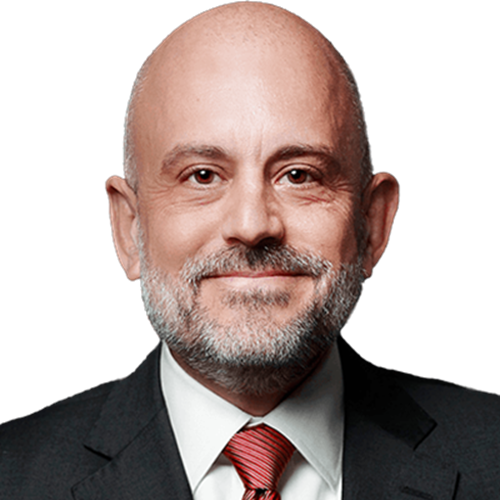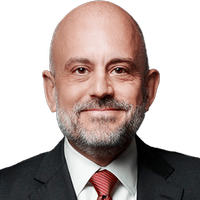Living a Life of Purpose after Retirement: 3 Action Steps to Take
When someone asks about what you do, the answer shouldn’t be, “I’m retired.” There is more to the second half of your life … a lot more.

Profit and prosper with the best of Kiplinger's advice on investing, taxes, retirement, personal finance and much more. Delivered daily. Enter your email in the box and click Sign Me Up.
You are now subscribed
Your newsletter sign-up was successful
Want to add more newsletters?

Delivered daily
Kiplinger Today
Profit and prosper with the best of Kiplinger's advice on investing, taxes, retirement, personal finance and much more delivered daily. Smart money moves start here.

Sent five days a week
Kiplinger A Step Ahead
Get practical help to make better financial decisions in your everyday life, from spending to savings on top deals.

Delivered daily
Kiplinger Closing Bell
Get today's biggest financial and investing headlines delivered to your inbox every day the U.S. stock market is open.

Sent twice a week
Kiplinger Adviser Intel
Financial pros across the country share best practices and fresh tactics to preserve and grow your wealth.

Delivered weekly
Kiplinger Tax Tips
Trim your federal and state tax bills with practical tax-planning and tax-cutting strategies.

Sent twice a week
Kiplinger Retirement Tips
Your twice-a-week guide to planning and enjoying a financially secure and richly rewarding retirement

Sent bimonthly.
Kiplinger Adviser Angle
Insights for advisers, wealth managers and other financial professionals.

Sent twice a week
Kiplinger Investing Weekly
Your twice-a-week roundup of promising stocks, funds, companies and industries you should consider, ones you should avoid, and why.

Sent weekly for six weeks
Kiplinger Invest for Retirement
Your step-by-step six-part series on how to invest for retirement, from devising a successful strategy to exactly which investments to choose.
When I talk about my definition of retirement, I think it sometimes catches people off guard. In my mind, retirement is not who you are or where you’re at in life, rather it is the transition of your time and money. In other words, it is a process you go through … not your identity.
The transition for money is a transition from accumulating money to utilizing it. For time, it is a transition of reallocating the 40-plus hours per week you spent working.
This distinction of what retirement means is an important one to make, because many people identify themselves with their work — but when someone is no longer working, they default to labeling themselves as “retired.”
Here is the problem: This default “I’m retired” mindset leaves people stuck, and they never really progress toward reinventing themselves. In essence, they have made retirement their new identity, which just seems odd considering when you say something is “retired” it often infers that it has outlived its usefulness.
But I don’t think this is an accurate description for most successful people who have lived a life of purpose, who have gained valuable insight and wisdom from their life experiences and who have refined their talents and unique abilities over decades.
Therefore, retirement should not be a label used to describe who someone is — it’s not their identity — rather, retirement is a term used to describe the transition a person is going through from one phase of life to another. This is important, because the success of your retirement transition is predicated on how well you grasp this distinction and your ability to shift your mindset in the following three key areas.
If done successfully, you can emerge on the other side of your retirement transition living a life of abundance.
Securities offered through Kalos Capital Inc., Member FINRA/SIPC/MSRB and investment advisory services offered through Kalos Management Inc., an SEC registered Investment Advisor, both located at 11525 Park Wood Circle, Alpharetta, GA 30005. Kalos Capital Inc. and Kalos Management Inc. do not provide tax or legal advice. Skrobonja Financial Group LLC and Skrobonja Insurance Services LLC are not an affiliate or subsidiary of Kalos Capital Inc. or Kalos Management Inc.
Securities offered only by duly registered individuals through Madison Avenue Securities, LLC. (MAS), Member FINRA & SIPC. Advisory services offered only by duly registered individuals through AE Wealth Management (“AEWM”), a registered investment adviser. Skrobonja Financial Group, LLC, Skrobonja Insurance Services, LLC, AEWM and MAS are not affiliated entities. The article and opinions in this publication are for general information only and are not intended to provide specific advice or recommendations for any individual. We suggest that you consult your accountant, tax or legal adviser with regard to your individual situation.

Action #1: Reinvent Yourself
St. Augustine said that asking yourself the question of your own legacy — “What do I wish to be remembered for?” — is the beginning of adulthood.
In Bob Buford’s book Halftime, Bob quotes Matthew 13:5-9, which illustrates the eventual harvest of a farmer who sows his seed. Bob uses this verse to point toward his own epitaph of 100x. He says, “I want to be remembered as the seed that was planted in good soil and multiplied a hundred-fold. It is how I wish to live…how I attempt to envision my own legacy…to be a symbol of higher yields, in life and in death.”
The theme of the book is what the title suggests: that wherever you are right now, you are at halftime in your life, and the second half should be the better half.
Every day up until your retirement transition, you dedicated eight or more of the 24 hours a day that you had to someone or something to earn a living. That commitment of time and what you were responsible for during that time manifests into a sense of purpose. When that time commitment goes away, so can that sense of purpose.
Your purpose while working may have been closely associated with your daily projects, leading a team, fulfilling a role or other responsibilities. It could have been a sense of belonging to a team, a brotherhood (or sisterhood), a company or group that gave you motivation each day to go to work. This is all left behind once you retire, and what often happens after the “retirement party” is over is the onset of feeling lost, unfulfilled, bored or even depressed.
This underscores the importance of viewing retirement as a transition, not as your new reality.
When I consult with clients who are retiring, I often encourage them to begin thinking about how they will spend their time once they make the transition. This conversation is not only important for cash flow planning, but it is the first step in helping them begin to think beyond the transition of retirement and about their purpose.
Playing golf, traveling and spending time with grandkids are all great things, but they are not anyone’s purpose. When asked what someone does, unless they are a professional golfer, they aren’t going to say they golf. They may play golf, but it is not their purpose.
Author and futurist Buckminster Fuller has a question designed for finding your life’s mission: “What is it on this planet that needs doing that I know something about, that probably won’t happen unless I take responsibility for it?”
The transition of retirement is not the destination; it is the transition to what is next. It is your opportunity to reinvent yourself and live out the second half of your life with purpose.

Action #2 Reframe Your Mindset About Money
I dedicate my podcast — The Common Sense Financial Podcast — to helping people align their money with their purpose. Now, you may think that money alignment is something fairly obvious to everyone, but so much of what people do with their money is not at all in alignment with their purpose.
Nearly 100% of the time, when someone hires my team to plan their retirement transition, I find that their money is either sitting in 401(k)s or IRAs invested for growth or they have large amounts of money sitting in cash.
So yes, I saw a need to dedicate an entire podcast on helping people align their money with their purpose, because I have found that there is a vacuum of common-sense financial information available to retirees. The goal of the podcast is to bridge the gap between what people dream about in their thinking time and what they need to do with their money to make what they are dreaming about a reality.
More often than not, people tend to envision a life of abundance for themselves or being able to leave a financial legacy for their children and grandchildren. But without knowing how to go about this, people will inherently default to what they know and think they understand — which, when it comes to making financial decisions, is most often rates of return and account balances.
As a result of this misalignment, confusion and feelings of unsettledness creep in when they attempt to retire and then discover that there is a disconnect between what they see their purpose for their money is and what their money is actually doing for them. It is like having a power cord that is too short to reach the outlet. You know there is power in the outlet, and the machine you’re trying to power up can do the job you need it to do but you can’t get them to connect, so nothing happens.
This is why measuring your financial success based solely on rate of return or how much money is in your bank account is the wrong measurement. The measurement for your success should be on how much income you can generate from your assets that is consistent and predictable. It’s income from your assets that grants you freedom of money and time so you can dedicate your talents to pursue your purpose.
To learn more about what this process entails, subscribe to The Common Sense Financial Podcast.

Action #3: Reframe Your Mindset of Time
In Dan Sullivan’s coaching program Strategic Coach®, he uses an exercise called The Lifetime Extender®. It is a tool used to formulate a new paradigm around time with the goal of making our future more important than our past.
The idea is that you have the choice to imagine your own future, and when you change the time frame you are operating in, you change the way you think. For example, Dan is planning on living to 156!
This exercise gives you the freedom to reframe your future and reprogram your thinking about how to live the second half of your life. There is a lot of psychology around how this works that I won’t get into here, but when you expand the amount of time you think you have left here on this earth, your mind begins to follow that way of thinking.
Now I realize that this may be a little too “woo-woo” for some, but when you consider that none of us actually knows how much time we have left to live, what do you have to lose?
You have a choice: You can live as if you have been set out to pasture to retire or you can live as if you are just entering your second half of your life. Your future reality is created in your mind, and whatever you focus on expands. So, expand your time and pick a number, then begin working on your future self. You can learn more about this idea from Dan here.
The key to a successful retirement transition is to reframe your mindset about money, focus on maximizing cash flow, expand your concept of time and reinvent your purpose in life, because there is likely more to your story that has yet to be written.
Securities offered through Kalos Capital Inc., Member FINRA/SIPC/MSRB and investment advisory services offered through Kalos Management Inc., an SEC registered investment adviser, both located at 11525 Park Wood Circle, Alpharetta, GA 30005. Kalos Capital Inc. and Kalos Management Inc. do not provide tax or legal advice. Skrobonja Financial Group LLC and Skrobonja Insurance Services LLC are not an affiliate or subsidiary of Kalos Capital Inc. or Kalos Management Inc.
Profit and prosper with the best of Kiplinger's advice on investing, taxes, retirement, personal finance and much more. Delivered daily. Enter your email in the box and click Sign Me Up.

Brian Skrobonja is a Chartered Financial Consultant (ChFC®) and Certified Private Wealth Advisor (CPWA®), as well as an author, blogger, podcaster and speaker. He is the founder and president of a St. Louis, Mo.-based wealth management firm. His goal is to help his audience discover the root of their beliefs about money and challenge them to think differently to reach their goals. Brian is the author of three books, and his Common Sense podcast was named one of the Top 10 podcasts by Forbes. In 2017, 2019, 2020, 2021 and 2022, Brian was awarded Best Wealth Manager. In 2021, he received Best in Business and the Future 50 in 2018 from St. Louis Small Business.
-
 Nasdaq Leads a Rocky Risk-On Rally: Stock Market Today
Nasdaq Leads a Rocky Risk-On Rally: Stock Market TodayAnother worrying bout of late-session weakness couldn't take down the main equity indexes on Wednesday.
-
 Quiz: Do You Know How to Avoid the "Medigap Trap?"
Quiz: Do You Know How to Avoid the "Medigap Trap?"Quiz Test your basic knowledge of the "Medigap Trap" in our quick quiz.
-
 5 Top Tax-Efficient Mutual Funds for Smarter Investing
5 Top Tax-Efficient Mutual Funds for Smarter InvestingMutual funds are many things, but "tax-friendly" usually isn't one of them. These are the exceptions.
-
 Social Security Break-Even Math Is Helpful, But Don't Let It Dictate When You'll File
Social Security Break-Even Math Is Helpful, But Don't Let It Dictate When You'll FileYour Social Security break-even age tells you how long you'd need to live for delaying to pay off, but shouldn't be the sole basis for deciding when to claim.
-
 I'm an Opportunity Zone Pro: This Is How to Deliver Roth-Like Tax-Free Growth (Without Contribution Limits)
I'm an Opportunity Zone Pro: This Is How to Deliver Roth-Like Tax-Free Growth (Without Contribution Limits)Investors who combine Roth IRAs, the gold standard of tax-free savings, with qualified opportunity funds could enjoy decades of tax-free growth.
-
 One of the Most Powerful Wealth-Building Moves a Woman Can Make: A Midcareer Pivot
One of the Most Powerful Wealth-Building Moves a Woman Can Make: A Midcareer PivotIf it feels like you can't sustain what you're doing for the next 20 years, it's time for an honest look at what's draining you and what energizes you.
-
 I'm a Wealth Adviser Obsessed With Mahjong: Here Are 8 Ways It Can Teach Us How to Manage Our Money
I'm a Wealth Adviser Obsessed With Mahjong: Here Are 8 Ways It Can Teach Us How to Manage Our MoneyThis increasingly popular Chinese game can teach us not only how to help manage our money but also how important it is to connect with other people.
-
 Looking for a Financial Book That Won't Put Your Young Adult to Sleep? This One Makes 'Cents'
Looking for a Financial Book That Won't Put Your Young Adult to Sleep? This One Makes 'Cents'"Wealth Your Way" by Cosmo DeStefano offers a highly accessible guide for young adults and their parents on building wealth through simple, consistent habits.
-
 Global Uncertainty Has Investors Running Scared: This Is How Advisers Can Reassure Them
Global Uncertainty Has Investors Running Scared: This Is How Advisers Can Reassure ThemHow can advisers reassure clients nervous about their plans in an increasingly complex and rapidly changing world? This conversational framework provides the key.
-
 I'm a Real Estate Investing Pro: This Is How to Use 1031 Exchanges to Scale Up Your Real Estate Empire
I'm a Real Estate Investing Pro: This Is How to Use 1031 Exchanges to Scale Up Your Real Estate EmpireSmall rental properties can be excellent investments, but you can use 1031 exchanges to transition to commercial real estate for bigger wealth-building.
-
 Should You Jump on the Roth Conversion Bandwagon? A Financial Adviser Weighs In
Should You Jump on the Roth Conversion Bandwagon? A Financial Adviser Weighs InRoth conversions are all the rage, but what works well for one household can cause financial strain for another. This is what you should consider before moving ahead.

